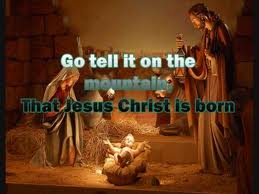Watching, Wandering, and Seeking

My Christmas gift to you is this version of the African-American spiritual “Go Tell on the Mountain,” sung by the Blind Boys of Alabama (with Stephen) on the Colbert Show.
Attend to the lyrics, which are about watching, wandering, and seeking:
When shepherds kept their watching
Over Wandering flocks by night (verse 1)
When I was a seeker
I sought both night and day. (verse 6)
He made me a watchman
Upon the city wall. (verse 7)
They’re also about humility as the virtue that tells the most truth about who we are:
Down in the lowly manger
Our humble Christ was born. (verse 3)
I asked the Lord to help me
And he showed me the way. (verse 6)
And if I am a Christian
I am the least of all. (versue 7)
Humility is even the imitation of Christ. He was born in a “lowly manger,” clearly inadequate temporary housing for displaced people on the move.
The lyrics of “Go Tell It on the Mountain” were changed by Peter, Paul, and Mary during the Civil Rights Movement to turn that Christmas carol into an anthem for that struggle for justice.
There’s nothing wrong with that, to a point. The American “Negro spiritual” typically has a double meaning that attends to two forms of liberation, one celebrated on Christmas and the other from slavery through political transformation.
But on Christmas we remember that the liberation we most seek we can’t provide for ourselves. We remember–or should remember–that we have the longings of wanderers, wonderers, and seekers, and that the truth about those longings is often captured in the music and poetry of those who might be regarded, from a socioeconomic point of view, as the most “lowly” of Americans.
So let me close with with a bit of the lyrics of a carol that originated with the lowly white people of Appalachia:
I wonder as I wander out under the sky
How Jesue the Savior did come for to die
For poor on’ry [ordinary] people like you and like I
I wonder as I wander out under the sky.





